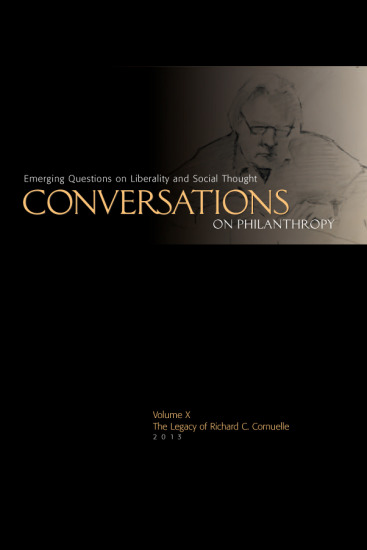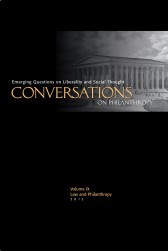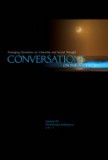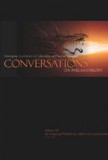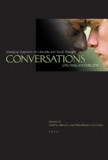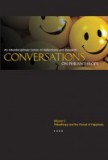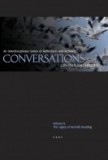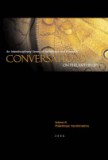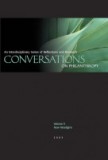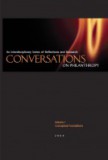Interested in learning more? Subscribe to our mailing list.
Conversations on Philanthropy is an annual publication of The Philanthropic Enterprise. Seeking to ignite reflection and discussion on the role of beneficence in the social order, Conversations features academic papers, essays, and reviews by scholars, philanthropists, and social entrepreneurs

Volume II New Paradigms, 2005
Download the entire journal as a PDF ![]()
To those of you reading Conversations on Philanthropy for the first time, welcome! And welcome back to readers of our inaugural volume, issued in the Fall of 2004. In Volume I we sought to revisit the conceptual foundations of contemporary philanthropy by reexamining the frameworks of modern economic and political thought in which philanthropic institutions of the twentieth century were situated. We sought not to discard the philanthropic institutions of the last century but to look at them more critically as a way of loosening their hold over the choices gift-givers might make in the future.
The lack of clarity about the proper role of philanthropy in a free society was represented in Volume I by the cover image of a flame. This image evoked the early philanthropic venture attributed by Aeschylus to Prometheus, who out of love for mankind impiously stole fire from the gods. (It is worth noting that Prometheus makes his second appearance in Conversations on Philanthropy in this issue, coming into the conversation here in Amy A. Kass’s comment on Richard Gunderman’s essay.)
In the present volume, we continue our effort to look at the familiar more closely, but as our cover art indicates, our authors in Volume II are reexamining philanthropy from a more organic perspective, casting an eye forward to how new philanthropic possibilities may be unfolding and how the best of these possibilities might be cultivated to provide new paradigms for philanthropic participation. Read More...
RICHARD GUNDERMAN majored in biology and philosophy at Wabash College, then received his PhD (from the Committee on Social Thought) and MD as a member of the Medical Scientist Training Program at the University of Chicago. He is currently Associate Professor of Radiology, Pediatrics, Medical Education, Philosophy, Liberal Arts and Philanthropy at Indiana University, where he is also Vice Chair of Radiology and Director of Pediatric Radiology. The recipient of numerous awards for teaching, scholarship, and writing, he regularly teaches medical imaging, medical ethics, and the ethics of philanthropy. He is the author of two books and over 100 scholarly articles.
STEVEN GROSBY is Professor of Religion at Clemson University. The author gratefully acknowledges a research fellowship from the Earhart Foundation, which afforded the time to comment on Dr. Gunderman’s paper.
JENNIFER ROBACK MORSE is a regular contributor to Forbes magazine and the National Catholic Register, a research fellow of the Hoover Institution at Stanford University, and a senior research scholar of the Social Philosophy and Policy Center at Bowling Green State University. She taught economics for fifteen years at Yale and George Mason University and is author of the book Love and Economics.
AMY A. KASS is Senior Lecturer, University of Chicago (on leave); Senior Fellow, Hudson Institute, Washington, D.C.; and Senior Fellow, The Project on Civic Reflection, a Lilly Endowment, Inc. project based at Valparaiso University.
FREDERICK TURNER is the Founders Professor of Arts and Humanities at the University of Texas at Dallas. He is the author of sixteen books of poetry, criticism, and fiction, including The New World: An Epic Poem; Rebirth of Value; Meditations on Beauty, Ecology, Religion and Education; and Tempest, Flute and Oz: Essays on the Future.
HERBERT LONDON is president of Hudson Institute and John M. Olin Professor of Humanities at New York University. He is author of the recently published book Decade of Denial (Lexington Books).
RICHARD P. GABRIEL received a PhD in Computer Science from Stanford University in 1981, and an MFA in Poetry from Warren Wilson College in 1998. He has been a researcher at Stanford University, company president and Chief Technical Officer at Lucid, Inc., vice president of Development at ParcPlace-Digitalk, a management consultant for several startups and Sun Microsystems, and Consulting Professor of Computer Science at Stanford University. He currently is a Distinguished Engineer and principal investigator of a small research group at Sun Laboratories, researching the architecture, design, and implementation of extraordinarily large, self-sustaining systems as well as development techniques for building them. He is Sun's open source expert, advising the company on community-based strategies. He is also President of the Hillside Group, a nonprofit that nurtures the software patterns community by holding conferences, publishing books, and awarding scholarships.
TYLER COWEN is Holbert C. Harris Professor of Economics at George Mason University and General Director of the Mercatus Center. He writes daily for www.marginalrevolution.com and can be reached at [email protected]. He is currently writing a book on American arts policy.
—Richard B. Gunderman
It is more blessed to give than to receive.
Acts of the Apostles 20:35
Many of us are operating with an incomplete paradigm of philanthropy. The prevailing view today neglects what is ultimately philanthropy’s most important mission: enabling as many people as possible to participate in philanthropic activity. It places unnecessary limits on what both donors and recipients are able to derive from philanthropic activity, and it undermines the achievement of philanthropy’s full potential. To remedy this situation and develop a more complete philanthropic paradigm, we must examine our most deeply held convictions concerning what philanthropy is and what it aims to accomplish. Read More...
In “Giving and Human Excellence: The Paradigm of Liberal Philanthropy,” Dr. Richard Gunderman urges us to develop a more complete understanding of philanthropy. For the purpose of these brief comments, philanthropy is to be understood as voluntary gift-making and other activities intended to serve a public benefit that cannot be tied to the pursuit of either commercial advantage for its own sake or to a specific, politically partisan goal. Read More...
Dr. Gunderman has given us an excellent introduction to the issues involved in developing a new and more humane paradigm of philanthropy. I want to suggest that his vision is both more radical and less novel than he seems to suppose. We have an entire sector already at hand to implement his vision. Yet harnessing this sector will require an even more radical shift in vision than that of merely giving up the charity view and the scientific view. I would like to call his view (and mine) an organic view of giving. Read More...
Everyone engaged in philanthropy today—whether as a donor, trustee, foundation leader, or program officer—is concerned about philanthropy’s status and future. Where is it headed? How effective is it? To whom and for what should philanthropists be accountable? Recent revelations of abuses in philanthropic foundations have eroded public confidence. Renewed congressional scrutiny has put philanthropic leaders on notice. Few seem to realize, however, that the answers to such questions ultimately depend on more basic matters, such as “Why give?” “To what ends?” “In what spirit?” Richard Gunderman is to be praised for taking us back to such basics. By developing a new paradigm for philanthropy—”liberal philanthropy”—which he claims is more complete than the two extant alternatives—”charitable philanthropy” and “scientific philanthropy”—Gunderman invites us to think afresh about what philanthropy is and what it aims to accomplish. Read More...
—Frederick Turner
The Cultural Challenge of Philanthropy
In an important sense, human beings exist as actors in a drama or characters in a story. That play or story is generated in part by the cultural leaders and founders of their society, and in part by their own and others’ constructions of their actions and motives in the context of the existing social scenario or in protest against it. As Shakespeare put it so much more simply and eloquently, “All the world’s a stage,/ And all the men and women merely players.” Read More...
Frederick Turner’s extraordinary essay sets the stage for an assessment of charitable gifts. Turner offers various models and forms of charitable activity that draw from science, history, and economics. On the whole, this is a truly impressive achievement. While I am generally sympathetic to his arguments, there are specific areas in which I part company. Most notably, I am not persuaded that the economic free market applied to culture leads to a salutary result. Culture—circa 2005—has been degraded by a free market unconstrained by virtue. The storytellers and thinkers Turner makes reference to have been seduced by commercial and “democratic” impulses. As a consequence, the tales of cultural revival so necessary in our age do not exist and, at the moment, are not likely to be funded by the foundation world or charitable gifts. Read More...
burn the page
wrestle like two on fire
place your bets on the field smoke
aligning like luck
and your fortunes
what I love
I give away
. . . come from the artists themselves. The artist’s responsibility is to art—as the poet William Stafford said, a “reckless encounter with whatever comes along”—wherever that leads, rarely part of a master plan, and even more rarely a part of the exchange economy. We read of muses and inspiration, but what these terms mean is that art is not entirely within the conscious control of the artist.
Art is voice. Art is noticing outside context. Art stands out like a thing glimpsed from the corners of our eyes. We must never confuse the subject or meaning of art with the fact of art. Art is not the story but the telling, not the picture but the brush strokes, not the thing but the choice of the thing, not the craft but the use of it. Each piece of great art sponsors its own context, creates itself through its own voice and terms; each of the parts in a piece, be it a poem or a painting, takes on heightened significance, and each part, because it is in a spotlight, becomes a bit strange. When experiencing art, the receptive mind creates a context to hold it, and everything that could be called the “meaning” of art is the construction of this context. Such a mind apprehends immediately whether art has authority, authority being the glow of heightened language or color or light or brush strokes, authority being the defining mark of art, authority being what the muse gives in exchange for the interiority of great art. The bargain is clear and unfortunate: there can be no great art on demand—any great art comes at the cost of strangeness and othermindedness, and what we take as great art on demand is merely the result of great craft and skill but without the depth of meaning of art, without its inherent isolation. No call, no desire, no need—when they come from outside—will or can move the artist to make art; calls for artistry externally constrained by topic or time produce, in most cases, doggerel or its equivalent. It is the rare occasional poem, the rare posed portrait, the rare commissioned biography, that is remembered as great art. Read More...
Does today’s America have an appropriate mythology for The Gift? Do we offer the right stories about why gifts are so important? Frederick Turner raises some concerns in his provocative essay. As would befit my broader body of work on the arts (Cowen 1998, 2000, 2002), I am optimistic. Let us first look at some facts and then return to the mythology issue, noting of course that a mythology can be true as well as convenient. Read More...

